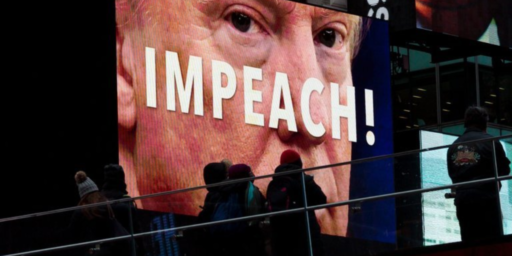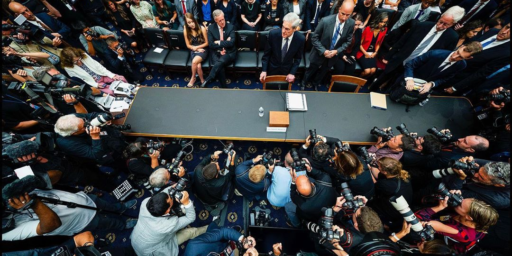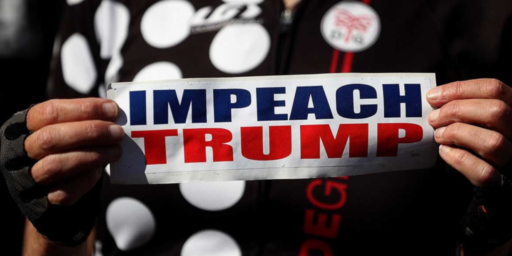House Democrats Remain Divided On Impeachment
The House Democratic Caucus is becoming more divided on the issue of moving forward with impeachment.

Last week’s testimony by former Special Counsel Robert Mueller was supposed to provide House Democrats with the impetus to move forward with impeachment. Instead, it has increased the divide within the party while the timeline for realistic beginning the impeachment process grows shorter and shorter. According to the judgment of many analysts, including yours truly, the fact that the hearings didn’t unveil anything significant that isn’t already known thanks to the Mueller Report and thus most likely weakened the political case for impeachment. That conclusion, however, hasn’t impacted the position of the growing number of pro-impeachment Democrats in Congress, a number that now includes nearly half of the Democratic Caucus:
Four more rank-and-file Democrats called for opening an impeachment inquiry against President Donald Trump on Sunday, inching lawmakers closer to a significant symbolic milestone: a majority of all House Democrats.
Though the steadily climbing total may not move Speaker Nancy Pelosi off of her resistance to opening a formal impeachment inquiry, Sunday’s burst of support suggests momentum behind the effort is growing and accelerating. More than a dozen Democrats — including Rep. Katherine Clark (D-Mass.), a member of Pelosi’s leadership team — have newly signaled their support since former special counsel Robert Mueller testified to Congress on Wednesday.
The four who issued their support on Sunday, all from Washington state, bring the total number of House Democrats who have publicly said they’d vote for an impeachment inquiry to 107 — 11 shy of a majority of the Democratic Caucus — with backers of an inquiry promising there are more waiting in the wings.
The lawmakers received a significant endorsement a short time later from Sen. Patty Murray of Washington, the third highest-ranking Democrat in the Senate and a close ally of Minority Leader Chuck Schumer. Murray said in a statement that “as we have learned more about the gravity of the potential threats to our democracy identified in Special Counsel Mueller’s report, it has become clear the House should begin proceedings to determine whether the President’s actions necessitate impeachment.”
Clark’s public call on Friday was the exclamation point in the House, but two other notable moves came that day when Reps. Mike Levin (D-Calif.) and Chris Pappas (D-N.H.) announced they supported an impeachment inquiry, as well. Both are among Democrats’ most vulnerable members seeking reelection, the so-called frontliners whom the House Democrats’ campaign arm is working to defend. Five others in that group have previously endorsed an impeachment inquiry.
Pelosi’s resistance to an impeachment inquiry is not likely to be vulnerable to the math of the Democratic Caucus — she has also argued that such a move would be unnecessarily divisive and likely to fail in the Republican-controlled Senate, strengthening Trump’s hand ahead of the 2020 election. Rather, she has urged a focus on the House’s myriad investigations of Trump’s conduct, business relationships and personal finances — some of which are tied up in court battles with Trump’s personal lawyers. Those probes, she has said, could form a more complete picture before considering impeachment.
But Pelosi on Friday also endorsed a new Judiciary Committee effort to go to court and seek access to Mueller’s secret grand jury evidence. In its petition to a federal judge in Washington, D.C., which was issued by the House general counsel, the committee argued that it was already investigating whether to recommend articles of impeachment against Trump.
Democrats who support an inquiry have also privately argued that reaching a majority of the caucus would be a turning point in their efforts, coaxing more reluctant lawmakers off the sidelines and ramping up pressure on Democratic leaders.
Notwithstanding the growing support inside the Democratic caucus, The Washington Post’s Amber Phillips is correct when she points out that impeachment is no closer from being reality than it was a month or two ago:
[T]he pro-impeachment caucus keeps growing, and it has powerful leaders in Congress open to backing it. But impeachment hits significant roadblocks when you dig into the numbers a little deeper.
Only nine of the 107 House Democrats who want impeachment proceedings to begin come from Republican-leaning districts. The rest of their more moderate colleagues make up the core of the other half of House Democrats, about 120 lawmakers, who oppose impeachment.
And those are the lawmakers who matter to House Speaker Nancy Pelosi (D-Calif.), the ultimate decider on impeachment. Her main job is to keep control of the House in 2020, and she’s worried that impeachment would undermine that goal.
She’s worried that lawmakers such as newly elected Rep. Lucy McBath in Georgia or Abby Finkenauer in Iowa or Lizzie Fletcher in Texas would get caught in the crossfire of an impeachment fight. They represent districts that voted for Trump in 2016 and/or lean Republican, and they knocked off Republicans last year to win their seats. They are top Republican targets for 2020. And they don’t support even beginning an impeachment inquiry.
“We need to see the underlying documents, and frankly we need to see the full unredacted report to be able to reach certain judgments,” Fletcher told Houston Public Media in April, which is code for: Stay the course on investigating Trump without elevating it to an impeachment proceeding.
The Post’s James Hohmann went to New Hampshire recently and talked to voters there about whether they would support beginning impeachment, as the state’s two Democratic representatives do. He found that the average Democrat isn’t clamoring for it. “[Trump’s] choices aren’t great, but I’m not sure he’s done anything that’s deserving of him getting kicked out of office,” Rich Fortier, a lifelong Democrat, told Hohmann. Might sentiments like that recalibrate how lawmakers think when or if impeachment actually gets going?
Among the 107 lawmakers on the pro-impeachment list, there are varying degrees of support for it. You have someone like Rep. Yvette D. Clarke (D-N.Y.), who represents one of the most liberal districts in the country, making clear that when she says she favors an impeachment inquiry, it means she wants to impeach Trump
And then you have someone like Rep. John Garamendi (D-Calif.), who represents a more moderate district, being much more noncommittal about whether he’d vote for impeachment. When Garamendi told The Washington Post after the Mueller hearing that he supports an impeachment inquiry, he had this caveat: “and then we will see where we go with an impeachment.”
This isn’t a theoretical roadblock to impeachment. Earlier in July, the House voted on whether to consider impeaching Trump. A majority of House Democrats voted to table, or set aside, a resolution brought by Rep. Al Green (D-Texas) calling for Trump’s impeachment.
It’s important to remember this wasn’t an impeachment vote. It was a procedural motion on whether to consider an impeachment vote, and 137 of the 235 House Democrats voted against it. Translated: When push came to shove, a majority didn’t even want to consider voting for impeachment. That’s why, even with nearly half of House Democrats supporting an inquiry, impeachment isn’t imminent.
From Nancy Pelosi’s perspective, the impeachment issue is far from an easy one. On one side she has a growing number of members of her caucus pushing for her to authorize the opening of an impeachment inquiry. This includes House Judiciary Committee Chairman Jerry Nadler, whose committee recently authorized the filing of an application to gain access to the material and testimony presented to the Grand Jury empaneled by former Special Counsel Robert Mueller. In that application, the committee represents to the court that the purpose of the application is to aid in its own inquiry into the question of whether or not to recommend an impeachment inquiry. Backing Nadler are the roughly 100 members of the House Democratic Caucus who have come out in support of beginning the impeachment process. On the other side, she has the members who put the Democrats over the top in their effort to gain control of the House of Representatives. Many of these members are more moderate and represent districts that were either won by President Trump in 2016 or are considered potential battleground seats in 2020. On the line is not just the Presidential election in 2020, but also the question of which party will control the House of Representatives beginning in 2021.
Pelosi is also likely well aware of the polling on this issue, which has consistently shown that most Americans remain opposed to the idea of moving forward with impeachment. We saw this in the most recent polls I wrote about just yesterday, as well as other polling dating back months all of which shows little movement in public sentiment on the issue. As I’ve said before, this is yet another indication of the political risks that lie before Democrats as they ponder what to do next. So far, Pelosi has been able to walk that line fairly well but there could be rough days ahead depending on which way her caucus tries to pull her.





The DCCC called me for money an hour ago. I told them they’d see my money when they impeached.
I have no way of knowing if others feel the same, but if they do, and D-trip funds run short, Pelosi will get the message.
@michael reynolds: Sixty-four percent of Democratic voters support impeachment.
That’s the Democrats for you, snatching defeat from the jaws of victory.
I think the Dems should open an impeachment inquiry. And I believe that’s what’s going to happen ultimately.
Dems are spooked about this for several reasons. First, I think they’re haunted by the specter of 1998 when the impeachment of Bill Clinton blew back in the GOP’s faces. But that’s only because the public didn’t think what Clinton did was that big a deal, and Clinton was already a popular president, so of course the public was going to react negatively to an attempt to impeach him over an extramarital affair. In contrast, Trump is unpopular and widely viewed as corrupt. While polls suggest that more voters oppose impeachment than favor it at this point, I suspect a lot of that has to do with Democratic reluctance. They’re making the opposition to impeachment into a self-fulfilling prophecy by opposing it themselves.
A more concrete concern is that impeachment could hurt Democratic lawmakers in swing districts. I think this is one of the main reasons Pelosi and other Democratic leaders in Congress have been treading carefully. I’m not as sour on Pelosi as some on the left, because I think she’s playing the long game, trying to build consensus before taking action.
One argument I keep hearing is, “We shouldn’t pursue impeachment, since there’s no way the Senate will convict. We should focus instead on removing Trump from office at the ballot box.” The problem with this argument is that it’s not an either-or. Dems can impeach knowing full well it’s not going to lead to his removal prior to Jan. 2021. But I think it’s important that they take a stand on the fact that Trump richly deserves to be impeached, and that any failure to remove him is on the Republicans’ head. Just giving up on it because the GOP won’t play ball is just preemptively surrendering to Trump’s being above the law.
Michelle Goldberg in NYT this AM begs to differ:
. https://www.nytimes.com/2019/07/29/opinion/trump-impeachment.html .
and:
@Kylopod: I don’t see the need or the utility in an impeachment “dog and pony show.” Having said that I will note that
1. I’m not a Democrat.
2. I don’t see Trump as “the problem” per se.
3. I live in a small population red county (slightly over 10% of the city limits population of Seattle) in a reliably blue state (Washington), so my vote literally counts as close to not at all as any vote in the nation.
So, I may well be an outlier in how much my opinion matters on this or any other question related to the coming election. It could be useful to know whether I am or not, though.
Why so many impeachment posts? You are starting to remind me of Cilizza and his Clinton email coverage and look what it did to his reputation.
@Kylopod: “First, I think they’re haunted by the specter of 1998 when the impeachment of Bill Clinton blew back in the GOP’s faces.”
The thing is, it did not. The GOP suffered statistically unusual losses, but only five seats. And then in 2000, they were close enough to steal.
@Raoul: “Why so many impeachment posts? You are starting to remind me of Cilizza and his Clinton email coverage and look what it did to his reputation.”
In the end, it did nothing to him, except maybe to help him. He’s still there.
@Kylopod: Yes to all you wrote. I want the steady drip, drip drip of revelations about the seamy and criminal activities of trump and the administration. Nadler has started this and I hope other committees follow. I especially agree that a failure to impeach will be on the heads of the GOP.
@Barry:
There’s a difference between “blew back in the GOP’s faces” and “caused irreparable long-term damage to the party.” Clinton’s approval ratings rose to the highest level of his entire presidency during the fiasco–73%–and other polls suggested the public was deeply opposed to what the GOP was doing. The fact that it’s only one of three times in the past century that the party in the White House has gained seats during a midterm, and that the other two times involved the big events of the Great Depression and 9/11 respectively, suggests there was significant blowback from the public, but that the fact it happened just before a midterm limited the potential damage the GOP might have sustained. What if it had happened going into a presidential election? I think you’d have seen a much more devastating impact on the GOP.
It’s true that Bush ran on “restoring honor and dignity” to the White House, but there’s simply no evidence it’s why he (sort of) won. Clinton was extremely popular at the time, and to the extent voters viewed him as a sleazy philanderer, nobody associated that trait with Gore. Of course Gore did make a mistake in attempting to distance himself from Clinton. But that just goes to show that it was a mistake to think Clinton was in any way politically damaged by the scandal.
The lesson we should draw from the Clinton impeachment is not it helped the Republicans but that it’s generally not a good idea to impeach over something frivolous. Which the current Trump scandals are anything but.
new house Democrats have been announcing all day. 30 mins ago Rep. Jason Crow made it 115.
@Teve: I’ve noticed a spate of GOP Representatives announcing retirement, also….I don’t know how “safe” their districts are, but every time they refuse to carry water for Trump, it makes me happy.
@Raoul: I think there are about 4 total stories out there right now:
Trump said something outrageous–people are offended
Boris Johnson shoots himself in the foot on Brexit
Biden still looks unstoppable
Impeachment
Which one of the other three is better clickbait?
They should draft the articles of impeachment based on the obstructions of justice Mueller enumerated in his report, and if they have a majority vote count – impeach him, and throw it over to Mitch to ignore.
For once, stand up and fight back. Situation reversed? Republicans would have impeached a Democratic president as soon after the report was released.
@al Ameda: They would’ve had articles of impeachment drawn up for Hillary before she was even inaugurated. “Something something eeeemails, something something Benghaaaazi”…..